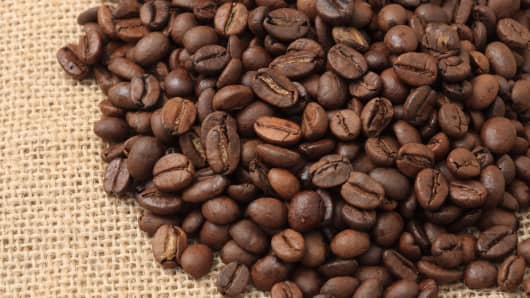Coffee futures may have gotten roasted over the past two years, but don't expect to pay less for your morning latte. Instead, the drop is seen as a boon for coffee sellers like Starbucks and Green Mountain.
Since hitting a high in May 2011, coffee futures have lost almost two-thirds of their value. In fact, the futures recently hit a four-year low of $1.15 a pound.
Largely to blame has been Brazil. The world's biggest coffee producer and exporter, Brazil produced a record crop in 2012. While the harvest is expected to be slightly down this year, it is still expected to be very large, and another record is expected in 2014.
If there's one company that's been helped by the price decline, it's been Green Mountain Coffee.
The slide in coffee prices has had an "enormous impact" on Green Mountain, said Jonathan Feeney, who covers the company for Janney Capital Markets. "You've seen nothing but top-line misses and enormous beat on the bottom line," because of the increased profits from lower coffee costs.
(Read more: Green Mountain earnings beat, revenue falls short)
And according to research released by Feeney on Monday, Green Mountain's commodity costs are down by 11.3 percent in September, compared with the year prior. "That alone would be inflationary to gross margins by 250 basis points," he said. In other words, Feeney expects the decline he's measuring for the month of September to add 2.5 percent to the company's profits.
After all, Green Mountain is in a "commodity-oriented business," Feeney explains. "It's a product that you just roast and put in a can."















